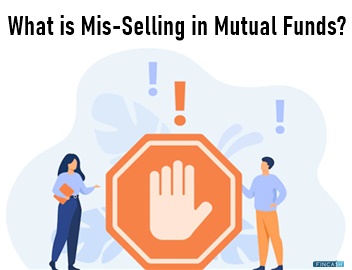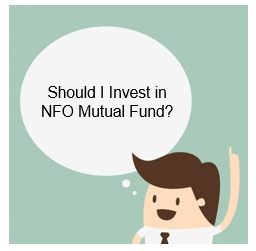What is Mis-Selling in Mutual Funds?
The best way to channelise your funds for the future is to invest them in the right place. There have been many emerging investment avenues besides the traditional ones. Each has its associated risks and returns. But these days, a new risk has emerged in the Investing sector.

The risk of mis-selling. Investors need to beware of falling into this trap of sellers. Or else, instead of multiplying their investments, they will lose all their money. For this, you need to have complete information on how and why this happens and, more importantly, how you can stay safe.
What is mis-selling?
Mis-selling is when a seller misrepresents a product or a service to a buyer and lures them into buying it. The problem of mis-selling has been on a rapid increase in the financial markets, where financial advisors, agents, brokers, and policy sellers are following this practice for their own benefit.
What is mis-selling of mutual funds?
A common man does not have enough Financial Literacy to understand the risk-return trade-off of investing in Mutual Funds, they often consult advisors or agents. These agents explain various available policies and recommend the most suitable policy for you, depending on your needs. Agent or broker gets a commission from the company on selling each policy. The rate and amount of commission vary for different policies. It is a bed of roses until everything goes this way. But now, mis-selling comes into the picture. This has been a common practice in the finance Industry these days. Whenever a seller or an agent sells a policy prioritising their gain instead of the benefit of the buyer, it is a situation of mis-selling.
Talk to our investment specialist
When is it mis-selling?
The Securities and Exchange Board of India (SEBI) has listed some specific acts carried out by sellers, either directly or indirectly, to defraud the public, which come under the purview of mis-selling, such as:
Hiding material information about a scheme or policy
Say, for example, an agent explains a mutual fund policy to you. The amount to be invested in the policy lies in your budget, but the agent conceals the fact that there has to be a payment of a fixed percentage of the agent’s commission on your part. You buy the policy anyways, and later you are told that you also have to pay the amount of commission. This way, you become a victim of mis-selling due to the concealment of information that could have affected your decision to buy the policy.
Not disclosing the actual risks involved in an investment
A seller might also understate the risk involved in a particular scheme. The omission of any information in the policy details will increase the risks involved even more.
Making someone buy a scheme that is unsuitable for them
Sure, various mutual fund policies are available in the Market. However, the suitability of these schemes varies according to your needs. For short-term fund requirements, investments are made in short-term debts; for medium-term requirements, investments are effective when made in a hybrid form; and lastly, for long-term fund requirements, equity investments are preferred. If an agent misguides you into buying an unsuitable scheme according to your needs, you are being mis-sold.
Making a false statement
This is the most common type of mis-selling. Telling buyers that there will be 'guaranteed returns' on a particular investment is nothing but making a false statement. Suppose a seller says that you will receive 20% returns on your investment, but in reality, the maximum return that particular industry can give is 10%. This is a mis-statement.
Why does mis-selling happen?
The primary reason so many people fall prey to mis-selling by agents is due to lack of knowledge. These days, people have realised the importance of saving, investing, and financial planning, but there is still a long way to learn the basics of the finance world. Sellers use this as an advantage to trick people and make the most profit out of deals. Another reason is the pressure that companies and banks put on their agents to complete the targets. At times, the agents and sellers are told that they will get their commission only if they complete a target. In a bid to do this, they often resort to unfair means such as mis-selling to achieve targets.
Sellers often claim that they have mentioned everything in the terms and conditions, and the buyer should have read it. Although this is a blunder on the part of the buyer, it is not entirely their fault. Often, these terms and conditions are framed in such a way that they have a lot of technical jargon that a layman finds difficult to understand. So, the buyers do nothing but very conveniently skip going through it.
How to stay safe from mis-selling?
Although the authorities have been working on new guidelines to stop mis-selling as much as possible and protect investors to the maximum possible extent, the investors also must do their part. Following are a few safeguards that can save anyone from the trouble of mis-selling.
Financial literacy
Financial literacy might seem too big and heavy to many of you. But, do not worry; being financially literate here does not mean you need to know the intricacies of investments. The basic knowledge of risks involved in various investment avenues, their suitability according to diverse needs, etc., is all that you need to know.
Choosing the right agent
Choosing a scheme offered by a trustworthy company or Bank will reduce the chances of the agent mis-selling to you. If you have enough knowledge, it is also possible that you might not need an agent at all. Choosing the right agent means being sure of their background, history, past performance, experience in the field, etc. An effective way to do this can be by reading reviews online.
Not going after highest returns
When you only run behind the highest possible returns, you tend to ignore the amount of risk involved in buying that investment scheme. In such a situation, you are more likely to fall for any scheme that the agent or seller describes as lucrative, even when it is not so.
Knowing the guidelines
The SEBI, Reserve Bank of India (RBI), and many other banking and government authorities have rules to curb mis-selling. They also have laid down the action that must be taken if someone is a victim of a mis-selling. Being an aware buyer means knowing about all this.
Conclusion
Mis-selling has become a stumbling block in the recent rapid rise of the investment sector. While investors have people realised the value of financial planning, some such sellers try to exploit loopholes. But the authorities are on their toes and have been taking stringent actions against the defaulters. But, being an investor, the most important thing is being aware.
Frequently Asked Questions (FAQs)
1. How can we avoid mis-selling?
A: Awareness is the best weapon you can use to avoid mis-selling. Basic financial knowledge, details of the scheme you wish to opt for, suitability of the scheme, and credibility of the seller are some very basic things you must know before buying Mutual Funds. Read the terms and conditions very carefully before progressing to buy a scheme.
2. Is mis-selling a crime?
A: Under the Companies Act, mis-selling shares and Debentures is a fraud. SEBI has also laid down regulations that have defined mis-selling as a fraudulent trade practice. The revised regulations have also laid down a penalty in this regard.
3. What are the reasons for mis-selling?
A: The major reasons for mis-selling are lack of knowledge, unawareness, lack of understanding, and lack of transparency. Sometimes agents are self-centred and, in a bid to earn more commission, they follow unfair practices.
4. How do you know if you have been mis-sold a mutual fund?
A: The most common mis-selling is when a seller glorifies a scheme or guarantees returns on it when in reality, it is not so. An all-flowery picture of any investment option will mean there is something fishy. Remember, no investment comes without a risk.
5. Can I claim back mis-sold mutual fund?
A: When you are mis-sold a mutual fund policy, you are in a position to claim the amount you lost in the process. You can hold the seller liable to pay for the damages. Ensure you are well-versed with SEBI’s guidelines before acting against the seller.
All efforts have been made to ensure the information provided here is accurate. However, no guarantees are made regarding correctness of data. Please verify with scheme information document before making any investment.










